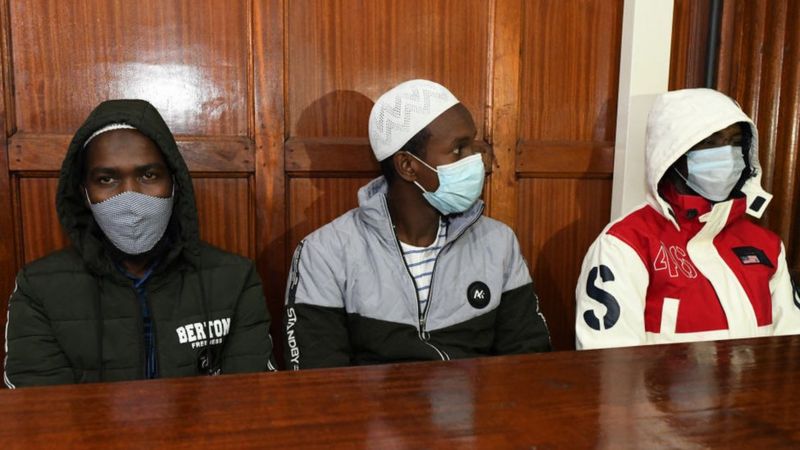A Kenyan court has found two men, Mohamed Ahmed Abdi and Hussein Hassan Mustafah, guilty of helping Somalia-based armed group al-Shabab fighters launch a 2013 assault on a Nairobi shopping mall where gunmen massacred at least 67 people.
A third man, Liban Abdullah Omar, who also faced charges under the country’s terrorism-prevention act, was acquitted on all charges in the judgment.
The ruling comes more than seven years after gunmen from the al-Qaeda-linked group, al-Shabab carried out the attack.
“The prosecution has proved its case against the accused on charges of conspiracy of committing a terrorism act and supporting a terrorist group,” Chief Magistrate, Francis Andayi said as he read out the verdict.

The case’s prosecutor is reportedly pushing for the maximum sentence.
On a Saturday afternoon in September 2013, gunmen entered the Westgate mall and opened fire on shoppers, leading to a four-day siege.
The militants fired indiscriminately at the crowds inside and detonated grenades, sending terrified people fleeing through the exits. The mall’s shiny floors were soiled with blood and scattered with lifeless bodies. Witnesses later said that the assailants had picked out non-Muslims for killing.
During the four-day siege to clear out the militants, the Kenyan authorities were criticized for an inefficient and disorganised response, with the police and military forces deployed in the mall even firing at each other. Soldiers were caught on camera stealing goods from shops in the ruined mall. Security officers also fired a rocket, leading to the collapse of entire floors in the five-story building, including the rooftop parking lot.
Kenyan and Western officials have said that four gunmen from Somalia were involved in the attack, and that all were killed during the siege.

The trial is the only prosecution Kenya has mounted so far over the attack carried out by al-Shabab fighters. The two convicted were found by the court to have provided support to the gunmen who carried out the attack by communicating with the assailants, knowingly supporting the commission of a terrorist act and possessing materials connected to a terrorism offense.
Kenyan advocates have said that the trial provided little comfort for the loved ones of victims because it shed little light on what happened during the attack itself.
The three men put on trial “are not in any way the masterminds, not even the attackers”, Otsieno Namwaya, senior Africa researcher at Human Rights Watch, said.
“It’s believed that the attackers escaped, and masterminds are still unknown. These three must have been fringe players, if at all.”
Since 2011, al-Shabab has vowed retribution on Kenya for sending troops to Somalia.
In 2015, the group killed 148 people, a majority of them students, at a university in northeastern Kenya. That was the country’s deadliest terror attack since Qaeda-linked militants bombed the United States Embassy in Nairobi in 1998, killing more than 200 people.
In 2019, 21 people were killed after the Shabab targeted a luxury hotel and office complex in Nairobi. In January 2020, Shabab fighters killed three Americans and destroyed a surveillance plane when they stormed a Kenyan military post where U.S. troops were based.























